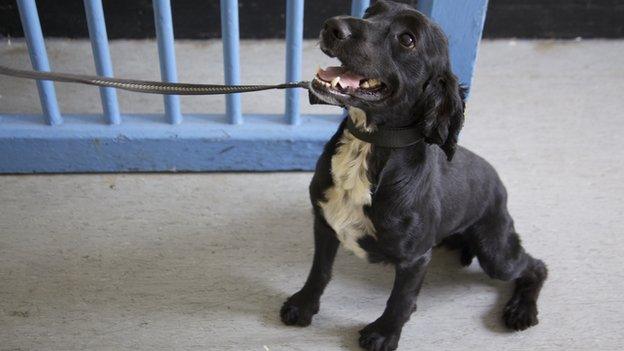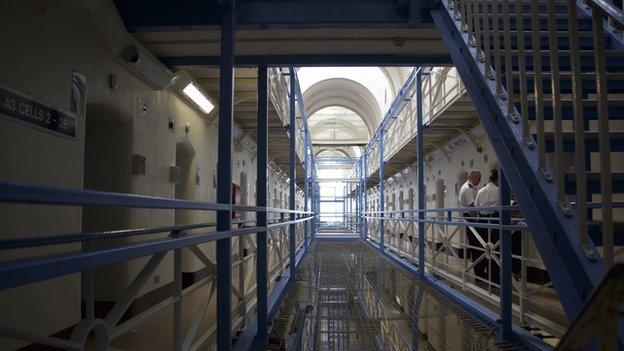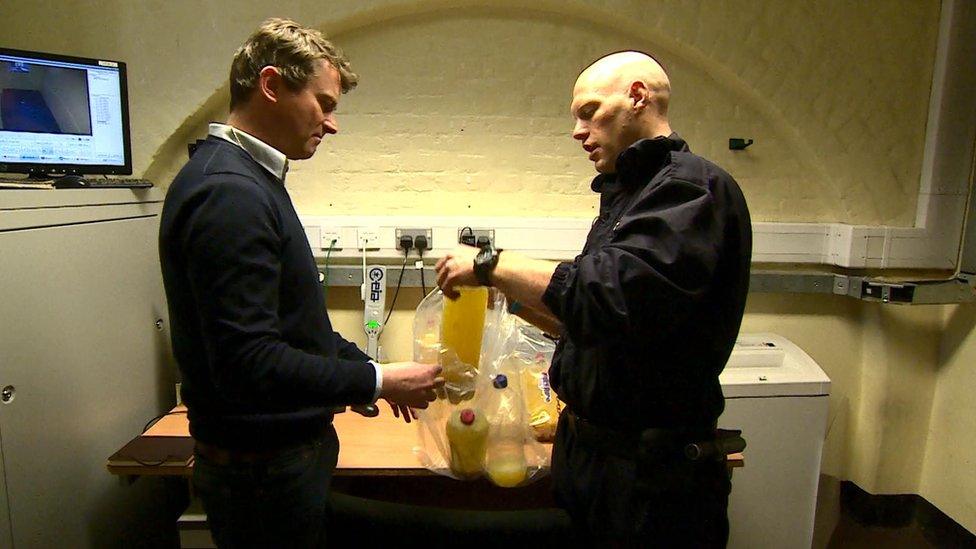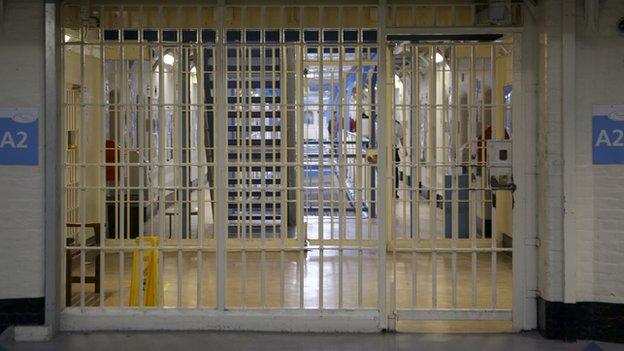Inside Wandsworth prison: Drugs and tension
- Published
The BBC's Ed Thomas has been given exclusive access to Wandsworth Prison
BBC News has spent a week filming inside Wandsworth prison, one of the six prisons where governors will be given new powers over budgets and setting the daily regime.
This is Wandsworth HMP, 2016. The doors have been unlocked. And, for seven days, the BBC has been given unprecedented access.
Nothing is out of bounds, the segregation unit, access to drug rehabilitation, and, of course, the prisoners.
The first thing that hits you is the noise.
The jail, built in the 1850s, echoes to the sound of 1,600 voices.
Dangerous men are held inside, some are murderers and rapists, others include pickpockets, drug dealers and fraudsters.
On our first walk around B-wing, a prisoner high up on the third floor jumps on to the netting between balconies. A scream of cheers from inmates goes up. The alarm goes, it is the first emergency of the day.
Prison officers rush to take him back to his cell, punishment for breaking the rules.

The prison's sniffer dogs seized £300,000 worth of drugs last year
Next it's A-wing. The alarm goes, and a young prison officer tells us to run - an inmate won't go back to his cell.
It takes eight officers to bring him to the ground. And he screams, swears and shouts throughout.
The man is a murderer. We can't name him, but 20 years ago he killed a man in a fight. And he tells us he is trapped in a cycle of violence.
"I got sliced down the side of my face," he says. "I've been attacked by [groups of] 15 people, three people.
"I've had my arm broke, I've got three broken bones in my hand, I've had murders left, right and centre.
"I've gone to [officers] and said, 'You're putting me in a predicament where I have no alternative but to utilise violence for my own safety.'
"With the greatest respect, they're so short-staffed in here, this place can't run, it's unsafe. Even a lot of staff in here are in fear."

Wandsworth is one of six prisons where governors will be given new powers over budgets and the daily regime
Days later, we move back on to B-wing. And the smell of cannabis is everywhere.
We walk down the corridor. And then we can see it, inmates smoking openly. They cheer and shout when they see the camera.
To be sure, I ask the inmate next to me what it is we can smell.
"It's cannabis, isn't it?" he says with a smile. "I'm getting high just standing here."
He tells us drugs are everywhere. Then, he makes us an offer.
"Do you want to score? I can get you some cannabis right now," he says.

Prison officer Tom Heaton showed us eight bottles of hooch seized from inmates after being brewed inside the jail
Next to us throughout all of this is a prison officer: she seems powerless. The smell of cannabis is now overwhelming.
"It's not good," she says, "It defeats everything we're trying to do."
And it's not just cannabis that the prison officers show us in their evidence room.
It is packed full of banned items, and the smell is overpowering.
We are shown a quantity of the synthetic "legal high" Spice valued at £8,000 inside prison, where prices are hugely inflated.
In other bags, we see more cannabis, mobiles phones, weapons and alcohol brewed in cells.
The officer in charge of the prison's two sniffer dogs says £300,000-worth of drugs were seized inside the jail last year. We are told some prisoners commit crimes just so they can go to jail to deal drugs.
We are then taken on a tour of A-wing by a prisoner.
He doesn't want to be named but wants to talk about corruption.
"I know officers that charge you, say, £500 a parcel the size of, say, three tennis balls, full of drugs, phones, whatever you want," he says.

Prison and Courts Reform Bill (England and Wales)
Wednesday's Queen's Speech outlined plans for changes to the prisons' system, including:
New "reform" prisons to be opened, with emphasis on training, rehabilitation and education
Governors of new prisons to have freedom to agree service contracts and establish their own boards
More statistics on post-release offending and employment rates to be published
Courts and tribunals to be modernised, with greater use of technology to reduce delays

Stamping out corruption
Ian Bickers, the prison governor, wants to lead prison reform. He wants control of his budget, the workshops he puts on for prisoners, the classes, even the contracts with outside providers such as utility companies.
It is his passion - he can see a better way to rehabilitate and do good for society as a whole.
And he says corruption will be on his reform agenda.
"It is the one thing I absolutely cannot stand," he says.
"One of the first things we would do with reform is to think very carefully about how do we would deal with those issues of corruption and what do we do to tackle those staff bringing drugs in.

Wandsworth prison holds more than 1,600 inmates
"Because that will deal with some of those issues you've highlighted and seen over the last week."
But how long will reform take? The pressure inside is building now, officers are getting hurt.
Officer Andy Topping, who has worked at Wandsworth prison for 24 years, says it is now worse than ever.
"I care, I want to make a difference, I believe my staff want to make a difference," he says.
But he adds: "We're struggling, we haven't got the staff."
And Mr Topping believes, as a prison officer, his mental health is not on anyone's agenda.
"I'm probably the most stressed I've been in 24 years in this job," he says.
"If I'm like my colleagues, I'll retire and die early."
This is a jail at the centre of social reform. The promise is that prisons will no longer be warehouses allowing men to fester and get angrier.
For the first time in generations there is a recognition that men serving time need a real opportunity to rehabilitate.